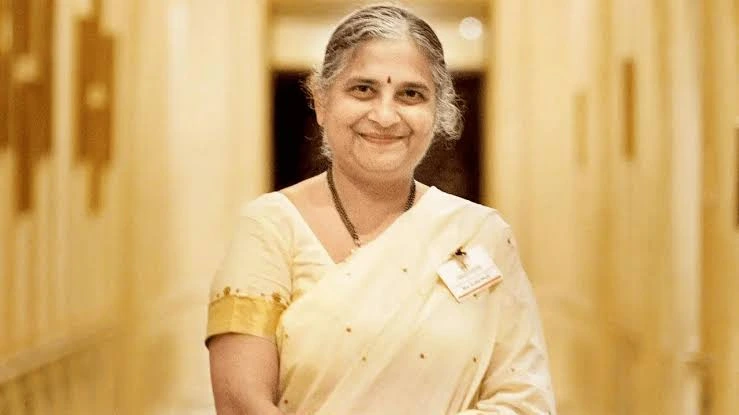Stitching Wisdom with Simple Threads
There is a tremor in the air the moment her sentences arrive—quiet, almost self-deprecating, yet lit with an Amar Chitra Katha glow. You read them on a rattling Deccan train, or under the iodine streetlamp of a small‐town library, and suddenly you feel your shoulders loosen: here, at last, is a voice that remembers how an ordinary life can still be magnificent. Sudha Murty, engineer, author, philanthropist, Rajya Sabha parliamentarian since March 8 2024, has parcelled that consolation across more than three hundred titles, selling in the millions and travelling into every major Indian language. Through her stories of tailors and teachers, cooks and clerks, she coaxes us toward a gentler modernity, one act of kindness at a time. From that humming body of work, here are fourteen lessons worth folding into your pocket before the day’s bustle begins.
1. Humility Outshines Pedigree
When a young Sudha wrote a postcard to J. R. D. Tata complaining about TELCO’s “men only” recruitment ad, she expected a lecture. She received an interview—and a job that made her India’s first female engineer on the factory floor. In “Wise and Otherwise” she retells the episode not to champion herself, but to praise a chairman who listened. The story reminds us that social hierarchies are not temples; they can be nudged by a single, politely fearless voice.
2. Education Is the Great Leveller
The title vignette of “How I Taught My Grandmother to Read” reveals a 12-year-old granddaughter turning tutor. The grandmother’s tears, shed over a missed episode of the Kannada serial Kashi Yatre, dissolve the myth that age guarantees wisdom. Sudha’s lesson is clear: learning is a river—enter it at any bend, greet it with the same thirst.
3. Give, but Give Silently
Infosys Foundation grants have built classrooms, hospital wards, public toilets—yet Murty often writes herself out of the frame. In “The Day I Stopped Drinking Milk,” a tribal woman in Odisha gifts her a pail of cow’s milk, the only wealth she owns. The author accepts it because refusing would wound pride. Giving, she implies, is a duet: dignity is the other singer.
4. Talent Blooms in Unlikely Soil
In the novella “Mahashweta,” Anupama’s leucoderma blotches push her from marital halls to village schoolrooms, yet her Sanskrit scholarship sparkles undimmed. Murty whispers: scars are not silences; they are punctuation marks in the paragraph of purpose.
5. Marriages Are Negotiations with the World
Read “Gently Falls the Bakula.” Watch Shrikant’s corporate ambitions dam the river of his marriage to Shrimati, a historian whose own spark is slowly smothered. Ambition is not villain, Murty shows; neglect is. Love must be watered, not merely worn.
6. Wealth Is a Trust Deed, Not a Trophy
Visitors to the Murty home in Bengaluru notice an absence of ostentation—metal utensils, cotton saris, a bookshelf that bulges like a sari-shop shelf. In essay after essay she argues that money is most alive when it leaves your palm.
7. Laughter Is a Social Glue
The Gopi Diaries, narrated by her golden retriever, are not children’s fluff but sly sermons: take long walks, greet the postman, sniff the day before judging it. In the wag of that tail, stress loosens like old paint.
8. Memories Deserve Archiving
Murthy’s 2025 novel “The Circle of Life,” published on January 29, pieces together five friends across fifty years, reminding us that keeping journals, photographs, spice-stained recipe cards is a form of civilisational service.
9. Rule Books Bend for Compassion
In “Three Thousand Stitches,” she narrates the battle to rehabilitate devadasis. Bureaucracy, she writes, did not fall because of paperwork; it fell because a roomful of women threaded jasmine into her hair and called her akka—sister. Empathy chisels loopholes where law looks rigid.
10. Stories Make the Invisible Visible
Village lore about talking serpents or shape-shifting sages, retold in “The Serpent’s Revenge” and “The Upside-Down King,” do more than entertain children. They ferry subaltern ethics—gratitude, courage, ecological reverence—into the smartphone age. Myth is our oldest operating system; update it, don’t delete it.
11. Letters Can Rewire Fate
A single sheet of ivory paper delivered Narayana Murthy’s proposal, accepted on Sudha’s own terms: no dowry, shared dreams. Decades later that partnership bankrolls thousands of scholarships. Hand-written courage, she insists, still matters.
12. Failure Is a Season, Not a Sentence
From “House of Cards,” where a doctor’s rural clinic collapses under corrupt cement, to the real-life drought relief projects that sometimes stalled, Murty shows us stumbles in first-person. Each failure sits in the narrative like a comma, never a full stop.
13. Citizenship Begins at the Neighbour’s Gate
In “The Old Man and His God,” an octogenarian priest in a coastal hut refuses to abandon his storm-ravaged temple because “the tides need my bell.” The anecdote urges us to bell our own corners: sweep the staircase, water the roadside neem, vote with thought.
14. Wonder Is Renewable Energy
Whether it is a schoolyard tree that teaches fractions, or a refugee child marvelling at the hiss of first-ever running water, Murty’s pages teem with quotidian miracles. Cultivate astonishment, they say, and you will never be poor.
A Closing Stitch
One evening this spring I watched college students spill out of Bengaluru’s Metro, frowning at screens. A dog nosed an abandoned vada-pav wrapper; a jasmine seller hummed an old Lata tune above the traffic drone. I thought of Murty’s newest confession in “The Circle of Life”—“What we keep, keeps us.” The line fluttered like a prayer flag over the crowd. If we keep her lessons—legible, lilting, luminously simple—perhaps they will keep us too: a little softer in gait, a little sturdier in storm, our pockets and hearts holding the same essential cargo.
